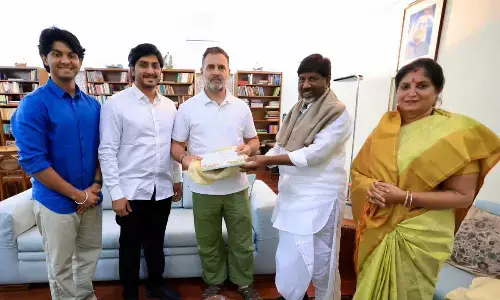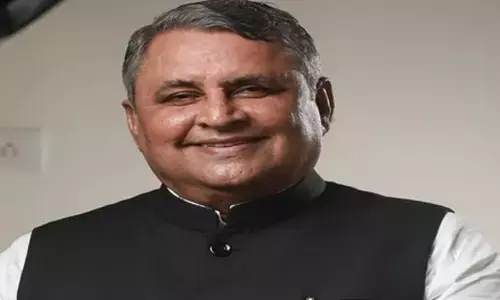NEP 2020 needs to incorporate India's past glory

NEP 2020 needs to incorporate India’s past glory
The charter of the new National Education Policy (NEP) 2020 envisions “creating the education system holistic, flexible, multidisciplinary, and aligned to the needs of the 21st century and 2030 Sustainable Development Goals”.
Swami Vivekananda, the son of the soil, who has beaconed the light of Indian culture, once observed," I would prefer playing to football game in the open ground instead of reading the Bagvath Gita within the four walls". Swami Vivekananda's observation lays stress on 'physical' growth, which is said to be psychomotor domain (skills). And John Dewey, famous philosopher and psychologist of America, introduces the so- called "Learning by Doing" theory. This theory focuses the attention on the interaction of the pupil with the society at large. The knowledge which is being imparted in the curriculum cannot be complete unless and until it is put to practice in the society. This is the concept he says it as "hidden curriculum" which helps the student to acknowledge the 'value of the values' of both the individuals and societies by interacting with the society
The charter of the new National Education Policy (NEP) 2020 envisions "creating the education system holistic, flexible, multidisciplinary, and aligned to the needs of the 21st century and 2030 Sustainable Development Goals".
From the very look of it, the vision of NEP 2020 is spirited like the 'Preamble' of the Indian Constitution, where the 'soul' of the framework of NEP 2020 has got designed with. Post- colonial writer and the propounder of 'decolonisation', Frantz Fanon argues that in spite of the political freedom achieved by the Third World countries from Britain and at large of European countries, the colonial mentalities do permeate in these countries through the domains of education, media, government policies, and of pseudo- intellectualism.
So as to negate this colonial mentality i.e., the belief that cultural values of the Europeans are inherently superior than those of the Third World countries. Fanon analyses that in order to overcome this "inferiority" of the colonised, he asserts the concept of what is called "decolonization".
In his essay, 'On National Culture', Frantz Fanon says that coloniser without least considering the 'distinct national culture' as well as the 'history' of the colonised, the coloniser imposes colonised people as one of barbaric, degraded and low profile ones. Fanon advocates that to root out such internalised mentality among the colonised people, one needs to reconsider the nation's pre-colonial culture as well as its history.
In this context, NEP 2020, needs to incorporate the very idea of "reconsidering India's pre- colonial culture as well as its vast history. Of course, the NEP 2020 has spoken about Nalanda University model, but did not frame the' charter' based on the said model so.
It is known that from time immemorial India is the cradle of human civilisation. Well known French author and historian Romain Rolland says, "If there is one place on the face of the Earth where all the dreams of living men have found a home from the earliest days when man began the dream of existence, it is India."
Of the fact, it is quite necessary that NEP 2020 needs to consider India's vast glory of Indus Valley Civilisation. So far, of all the national educational policies of post-Independence have been banking upon western mode of education, say, the charter of 'Macaulay Minute' instead of Eastern oriented outlook. As is the case, these policies have failed to look at the models of Vishwa Guru Rabindranath Tagore's 'Shanthinikaten' and of "Tolstoy farm" of the Father of the Nation Mahatma Gandhi, of whose ideas guided the nation to usher in the freedom.
In Mahathma Gandhi's 'Tolstoy Farm', equal importance has been given to both manual and mental growth of the child. The structural shift of educational ladder from 10+2 to 5+3+3+3+4 is not considered as 'holistic' as being mentioned in the charter of vision of NEP 2020. The reason is that education basically aims at the desirable change of human behavior in accordance to the needs of existing society. And according to the Blooms Taxonomy, there exists three fundamental domains of learning- cognitive domain, affective domain and, psychomotor domain. The educational structure whether it is of 10+2 or of 5+3+3+3+4 only banks on what is called cognitive domain, while the other domains - affective domain and psychomotor domain - will remain dormant in the present framework of NEP 2020.
Swami Vivekananda, the son of the soil, who has beaconed the light of Indian culture, once observed," I would prefer playing to football game in the open ground instead of reading the Bagvath Gita within the four walls". Swami Vivekananda's observation lays stress on 'physical' growth, which is said to be psychomotor domain (skills). And John Dewey, famous philosopher and psychologist of America, introduces the so- called "Learning by Doing" theory. This theory focuses the attention on the interaction of the pupil with the society at large. The knowledge which is being imparted in the curriculum cannot be complete unless and until it is put to practice in the society. This is the concept he says it as "hidden curriculum" which helps the student to acknowledge the 'value of the values' of both the individuals and societies by interacting with the society.
Further, the preamble of NEP 2020 in the form of vision, proposes "… and aligned to the needs of the 21st century and the 2030 Sustainable Development Goals". In this connection, the road- map is not crystal clear in NEP 2020 towards this direction as is proposed. Mahatma Gandhi envisions India's growth through "rural development", it does not mean that development of rural milieu be transformed into urban milieu. Gandhi believed in, not to destroy natural landscapes for resources for mining and urbanisation. Gandhi believed in setting of educational institutions in rural milieu instead of urban milieu. And with regard to the reference of "Sustainable Development Goals" are concerned, nothing like its spirit is being reflected as such in the NEP2020.
It is said that leaders across the globe will have a monumental opportunity to reduce inequality, end of poverty, protect the environment and promote justice and peace by implementing what are called, "Sustainable Development Goals- 2017". And of all the Sustainable Development Goals, to foster environmental responsibility is the major pillar needs to be given the topmost urgency in the framework of NEP 2020 for the mission of education in 21st century to protect the environment for future generations.









